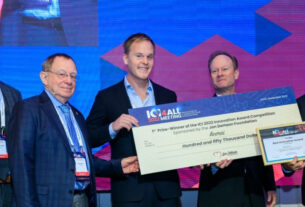Kiddush is a blessing traditionally made over a cup of wine that sanctifies Shabbat and holidays. Kiddush, which means “holiness” in Hebrew, is also recited at Havdalah and at lifecycle events, such as weddings, bar/bat mitzvahs and the bris.
When saying Kiddush over wine or grape juice, the blessing is:
בָּרוּךְ אַתָּה ה׳ אֱֹלהֵינוּ מֶלֶךְ הָעוֹלָם בּוֹרֵא פְּרִי הַגָּפֶן
Baruch ata Adonai, Eloheinu Melech ha-olam, borei p’ri hagafen.
Blessed are Your, Lord our God, Ruler of the Universe, who creates the fruit of the vine.
Why is wine used for Kiddush?
Wine has been associated with celebratory and festive meals in many cultures since ancient times. The Book of Psalms even says that “Wine gladdens the heart of man” (Psalms 104:15).
While wine is the most widespread beverage used for Kiddush, it is possible to recite Kiddush over other beverages. For those seeking a non-alcoholic option for Kiddush, grape juice has been a popular swap since talmudic times (Bava Batra 97b) because the language of the blessing includes the words pri hagafen, fruit of the vine.
Kiddush Without Wine on Friday Night: Use Challah
On Shabbat, Kiddush is recited as part of Friday night dinner and Saturday lunch. Jewish tradition understands Kiddush as having different functions on Friday and Saturday. In the Ten Commandments, God adjures the Jewish people to remember and sanctify Shabbat. Reciting Kiddush on Friday night fulfills both aspects of this commandment. At Shabbat meals on Saturday, Kiddush is recited again in order to make the meal special, rather than as a fulfillment of the commandment.
Since Friday night Kiddush is considered essential to fulfilling the commandment of sanctifying Shabbat, most Jewish authorities agree that Kiddush should be recited over challah instead of another beverage if wine is not available. Wine is considered the most important part of Shabbat dinner, followed by the challah. (Shulchan Aruch 272:9)
When saying Kiddush over challah, one should start with the prayer for ritual hand-washing, Netilat Yadayim, then say the full Kiddush while holding the challah, replacing the words borei pri hagefen with hamotzi lechem min ha-aretz. At that point, the challah is eaten and one does not need to make a separate Hamotzi.
In other cases, or when challah is also not available, other drinks can be used for Kiddush including beer, whiskey, tea and coffee. Preference should go to an “important” or preferred drink.
Kiddush Without Wine at Other Times: Alternate Beverages
For the Kiddush recited on Shabbat lunch, it is preferable to use an alternate drink (rather than challah) when wine is not possible.
Even in ancient times, Jews lived in places where other alcoholic beverages, such as beer and liquor, were more readily available than kosher wine. In these instances, the Shulchan Aruch encourages Jews to make Kiddush on whatever beverage is common locally for celebrations. (Shulchan Aruch 271:22) If alcohol or grape juice is not available, traditional Jewish law also permits making Kiddush over coffee or tea.
When using other beverages to make Kiddush, “fruit of the vine” is replaced by a more generalized blessing:
בָּרוּךְ אַתָּה ה׳ אֱלֹהֵינוּ מֶלֶךְ הָעוֹלָם שֶׁהַכֹּל נִהְיָה בִּדְבָרוֹ
Baruch ata Adonai, Eloheinu Melech ha-olam, shehakol ni-yeyah be-devaro.
Blessed are You, Lord our God, Ruler of the Universe, by Whose word all things come into being.
Find more information about making Kiddush here.
The post Can You Make Kiddush On Anything Other Than Wine? appeared first on My Jewish Learning.




